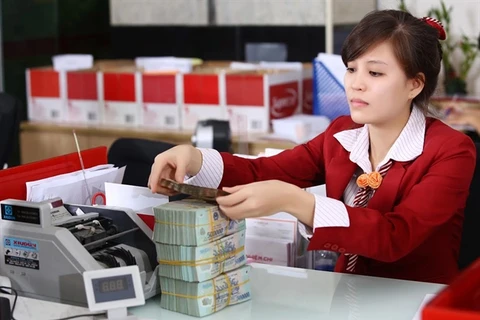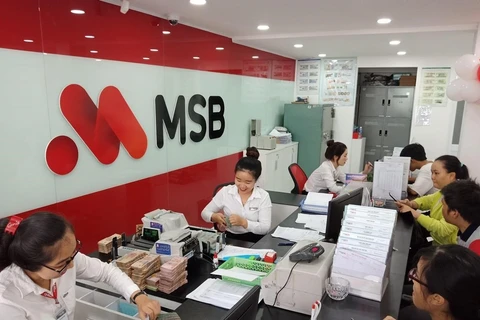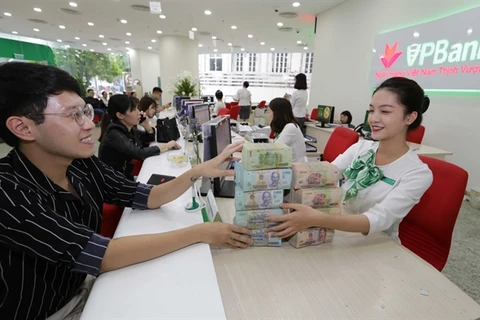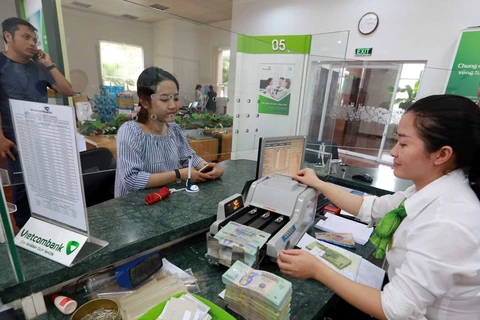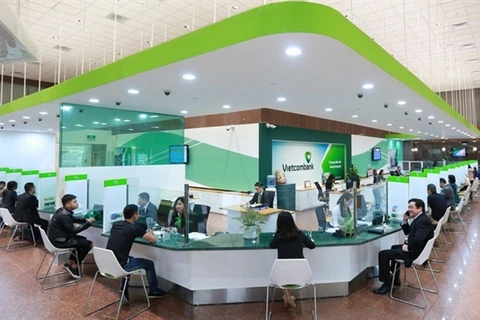Hanoi (VNA) – Commercial banks are facing mounting pressure to hike capital by the end of 2020 to satisfy Basel II’s capital safety and risk management standards. Therefore, many of them have paid dividends in shares, issued bonus stocks, or even asked to retain their dividends.
Under the State Bank of Vietnam (SBV)’s regulations, banks must maintain a capital adequacy ratio (CAR) of at least 8 percent per Basel II norms starting in 2020. The CAR of the banks will fail to reach the minimum level set by the SBV if they don’t increase capital.
Fitch Ratings estimated the Vietnamese banking system could face a capital shortfall of almost 20 billion USD, equal to 9 percent of GDP, to meet Basel II standards and increase allowance coverage.
Moody’s also noted that most Vietnamese banks would still lack sufficient capital to meet the Basel II requirements, so raising capital would be a key focus in 2019.
Customers dissatisfied as banks fail to make dividend payment
Clients at several commercial banks like Military Commercial Joint Stock Bank (MB), Joint Stock Bank for Foreign Trade of Vietnam (Vietcombank) and Vietnam International Bank (VIB) have rejoiced at the banks’ plans to pay dividend yields, which stand at 6 percent, 8 percent and 5.67 percent, respectively.
In stark contrast, shareholders at small banks have not received dividend payments for years.
At the annual shareholders’ meeting of Saigon Thuong Tin Commercial Joint Stock Bank (Sacombank) a shareholder with more than 1 million shares at the bank expressed his disappointment and asked if Sacombank’s customers would receive dividends this year.
“If no payment is made this year, what is the exact time for dividend payout?” he inquired.
Sacombank Chairman Duong Cong Minh said that as the largest shareholder, he wants to receive dividends. However, the bank’s plans are decided by the SBV as it is being restructured.
Following the merger with Phuong Nam Bank in 2015, Sacombank has not paid dividends to its shareholders.
Minh explained that the bank has to focus on the shake-up plan as well as handle bad debts. Besides, it has exerted huge pressure to raise capital to meet Basel II standards.
Meanwhile, Vietnam Prosperity Joint Stock Commercial Bank (VPBank) reported trillions of VND in profit, but it retained earnings to develop the bank.
According to Vice Chairman of the bank Bui Hai Quan, VPBank posted a post-tax profit of more than 7 trillion VND (300.4 million USD), and 3.4 trillion VND in earnings after setting up risk-reserve funds in 2017. The money was then used to branch out the bank’s activities but not for dividends.
Quan said the bank has to ensure owner’s equity as per Basel II norms.
“With undivided profits, the management board will ask the shareholders’ general meeting to approve a dividend payout plan in a proper time, which benefits both shareholders and the bank,” he stressed.
As for the Vietnam Technological and Commercial Joint Stock Bank (Techcombank), which announced 10 trillion VND in profit in 2018, the bank said it would not pay dividends but hold the earnings for business activities.
Last year, the bank paid stock dividends at the rate of 1:2, which means with each share, investors will receive two others in return. Earlier, the bank did not pay dividends for seven consecutive years.
In the same trend, the Vietnam Export Import Commercial Joint Stock Bank (Eximbank) retained all of its earnings of 704 billion VND in 2018, and did not make any dividend payout.
The bank’s management board said dividend payouts are made in line with Circular No.08/2016, which stipulates that the central bank allows credit institutions to extend the terms for special bonds, previously issued to swap for bad debt, without dividend payments to create a source of non-performing loan resettlements until the bonds are paid.
TPBank, KienlongBank, SHB and MSB also announced they would not pay dividends.
Stock dividends are preferable
According to the National Financial Supervisory Commission, commercial banks need to increase their charter capital by 1.8-2 times to meet the Basel CAR. Meanwhile, Moody’s said Vietnamese banks need an additional 7-9 billion USD in capital to achieve Tier 1 capital ratios of 11 percent in 2019.
Due to this, many banks have chosen stock dividends or issued bonus shares.
Notable banks in the race include ACB, VIB, HDBank, NamA Bank and ABBank.
As for State-owned banks, SBV Deputy Governor Dao Minh Tu said VietinBank, BIDV and Agribank are facing difficulties in increasing charter capital. Though they enjoy a 15-16 percent in credit growth annually, their capital has not been mobilised in a timely manner.
“The fact is that their CAR hit the bottom line of 9 percent, therefore, the SBV recommends them to use dividend resources to increase charter capital,” Tu stressed.
Nguyen Tri Hieu, a finance and banking expert, said banks should retain their benefits. Besides, they can scale up Tier 1 capital by issuing shares for existing and new shareholders, and increase Tier 2 capital by issuing bonds with minimum terms of five years or subordinated debts.
Meanwhile, PhD Can Van Luc, another finance and banking expert, said dividend retaining aims to create long-term earnings for banks.
Generally, increasing capital is a formidable task for banks which do not have good ratings and have been under pressure due to risk provision surges as bad debt rate remains high.-VNA


